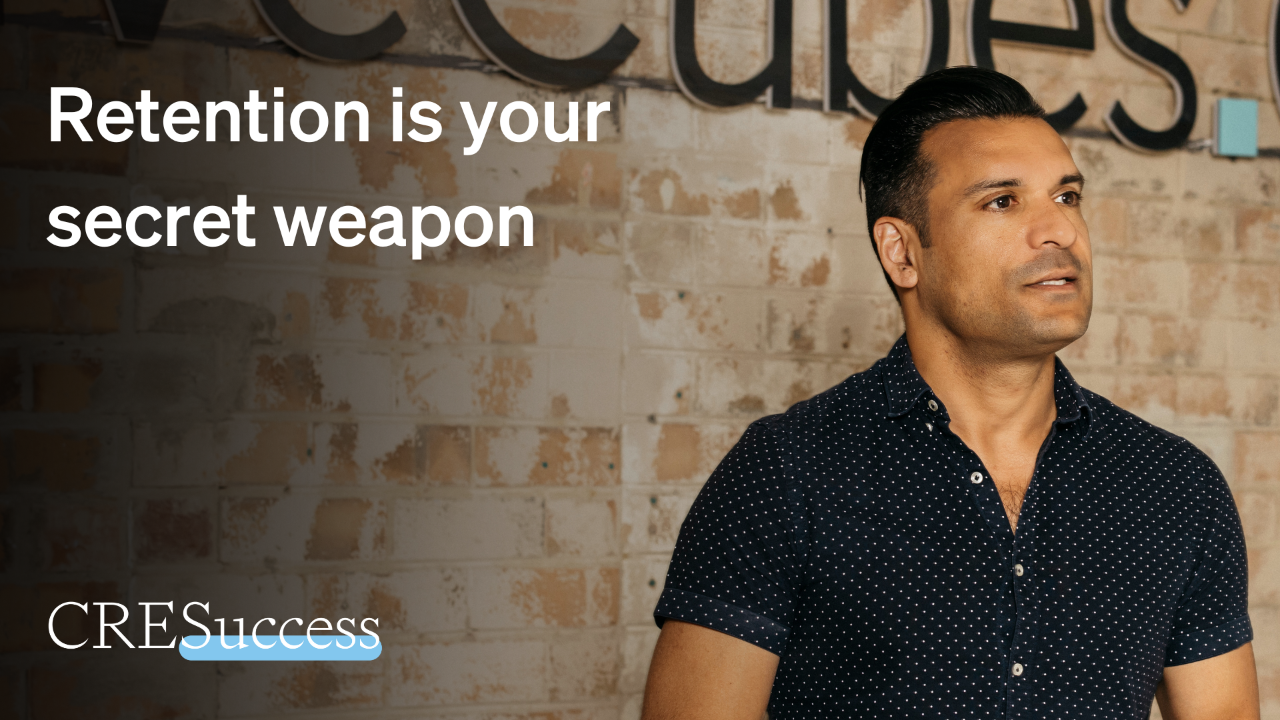Slow hiring is the cost of not having a recruitment process.
Feb 05, 2025
CRE Success Principle: Hiring slow has risks—but when you have confidence in your recruitment process, you can hire fast and fire appropriately.
You’ve probably heard the phrase: "Hire slow, fire fast."
For a long time, I thought this was solid advice.
That is, until I realised that to “hire slow” can create problems:
❌ Overloaded staff (if it takes too long to build capacity)
❌ Annoyed clients (if service delivery standards drop because your people are overloaded)
❌ Lost revenue (if we decline new business because we can’t stretch our existing team any further)
Plus, if you still got it wrong and “fire fast” after hiring slow, then you’re right back to where you started months ago.
And that is a really poor outcome.
So instead, I prefer: "Hire fast, fire appropriately."
To be clear, this doesn’t mean rushing into bad hires.
It means having a structured recruitment process that allows you to hire more quickly with a higher degree of confidence.
The CRE Success 7-Step Hiring Process includes creating a position description, sourcing candidates, shortlisting applicants, phone screening, interviewing, verifying references, and making the offer.
Each step is crucial to helping you avoid costly hiring mistakes.
When you trust your hiring process, you can make faster moves.
I lay it all out for you in episode 206 of Commercial Real Estate Leadership.
Episode transcript:
On last week's episode of the show, we were talking about why recruitment is the strategy to scale your success and to help you build your commercial real estate empire.
On today's episode, I want to put some meat on the bone and give you some specific ways that you can go about upgrading your hiring process.
And I'm also going to give you the exact 7 step process that I teach my private clients. So, stick around.
Hello. Welcome to episode 206 of Commercial Real Estate Leadership. I'm your host, Darren Krakowiak.
Thank you so much for joining us for another episode.
And just to let you know how committed I am to improve the content, to give you more of the information that you need to get the right people on your team serving ideal clients inside a business that just works, I wanted to let you know I was speaking to a podcast consultant just the other day about how I can improve the pre and post production process, and also how we can improve the, I guess, deliverability and distribution of the podcast.
And one thing that he told me was to just get a bit more of a handle on our follower numbers.
Our follower numbers are the people who are following us or subscribe to the podcast on platforms like Apple and also on Spotify.
So, I did have a look into that, and I can see there are some people who are listening to the podcast but aren't actually subscribed.
So, if that's you, I want to invite you if you're listening to us on Apple Podcasts or on Spotify, to push that plus button so you're always seeing the latest episode of commercial real estate leadership in your favorite podcast player.
I think as more people subscribe to the show that also improves the deliverability of the show to like-minded people who may also get some value from this content.
So, please do subscribe to the show.
If you're watching us on YouTube, by the way, we do upload every single episode to YouTube. We'd love a like.
Love a subscribe. We've got 444 subscribers at last check on YouTube.
So, thank you so much if you are watching us on YouTube, and please do like and subscribe to the show.
Alright. So today, I want to talk to you about recruitment.
We already talked about why recruitment is so important for commercial real estate principals and even high-performing commercial real estate agents who want to scale their success beyond their own production.
Today, I want to talk about some specific things that you can do to make this whole process run more smoothly.
And the first thing I want to mention is roles and responsibilities.
I think we've got to be really clear on what we're looking for and what the employment opportunity is when we're looking to recruit for a specific role.
Now this can involve writing a detailed description on the expectations that you have for the role, the duties in that position, and also the requirements.
So potential employees aren't left wondering if they are actually qualified for the position.
Now it might seem obvious to you about what the minimum requirements are, but I think we need to actually document them and write them down in the ad and then check to make sure that people are qualified during a phone screening process to get to the next stage.
So, we're not interviewing, for example, commercial real estate agents who don't have a driver's license.
So, we're not interviewing people to work in administration who don't know how to type.
I've had those two examples happen to clients of mine.
One of them luckily didn't get to the final offer stage, but I actually had one client who had someone in administration who wasn't up to the required standard of typing and unfortunately, they had to let her go.
And I think that that could have been avoided, and if we had just done some sort of check or test of whether that person had the required skills in order to perform the requirements of the role.
I want to move on to the next point now, which is about not just looking for people who have experience, but looking for people who have the right attitude, the right attributes, and also the aptitude required to succeed in the role.
Now, of course, there are some roles where people need certain experience and particular expertise or qualifications.
So, we can't just be teaching people on the job on how to be a trust accountant, they've got to have, the relevant qualifications to do that.
But for many of the roles that we have, we can focus on someone's attitude, that is their will and their willingness to do the role and to grow into that role.
We can also look at their attributes, like what kind of person are they, what characteristics can we see in them.
And if you're interested, some of my clients actually also test for this, so they conduct psychometric or psychological profiles in order to assess someone's suitability for a role.
You can also draft questions which can give you some idea about why people would handle certain situations, and I guess there's also the vibe that you get from people.
And then there's also the aptitude.
So, can we actually train them, skill them up to be able to perform the requirements of the role?
And I think when we're looking at experience, we limit ourselves to a particular set of people,
But when we look at people who have the right attitude, attributes, and aptitude, we all of a sudden have a broader pool of talent to draw on.
And similar to what I was talking about with driver's licenses or typing, we can also test for certain skills that will tell us if people have the prerequisite requirements to be able to be trained into the role.
So, I can remember the first job that I had out of university was as a consultant in a property economics consulting firm.
And I had to sit an Excel test because a lot of the work that we did was in Excel.
And that was a required level of skill that was needed. And I had to pass that test, which I did.
Another way that another client told me that he likes to test for certain minimum requirements that he expects people to have in terms of being good with numbers is to ask them a question, such as, “What is 20% of 200?”
Now, if you know how to work math’s in your head, you could probably figure that out. It's 40.
But that's the sort of thing, maybe that's a little bit hard that one.
Maybe you could say, “What's 10% of 1500?”, which is 150.
Whatever it is, test people's aptitude for numbers.
You can test their common sense by asking them questions about how they'll handle certain situations, or also having a look at how they would deal with certain scenarios with customers to see if they have a customer or client centric, perspective and disposition.
All right, so the next thing that I'd recommend that you look out for as part of when you are recruiting someone is making sure that you are clear about your vision and also about your values and to make sure that there is alignment.
So, it's really on you to communicate your expectations early and clearly and transparently throughout the recruitment process. Because if you don't tell people, they won't know.
And I think, sometimes the concern that people can have here is, is that they're worried about being too prescriptive about what they're looking for, because it may repel some people.
But that's OK. Because on the one hand, we don't want people who aren't aligned with our vision and values to be inside the business, (or at least I wouldn't want that).
But also, the people that do resonate with your vision and values are going to be more attracted to come and work with you.
And I think when you're clear about where you're going, people will either want to get on board or they want to get off at the next stop.
So, values alignment is important as well.
We want people to adhere to the values that are important to you.
And if they end up acting in a way that's inconsistent with those values, I think you can then have a very clear conversation with them about the fact that, well, you asked the question about those, they said that that was something which was important to them.
If they're not acting in accordance with that, they're the ones who are out of integrity, if you were clear about that, because they committed to that during the hiring process.
And that allows you to have a very clear conversation about the fact that, what your expectations were are not being met, and that is ultimately their responsibility.
The last point, or second last point I wanted to cover today is, well, this notion of "hire slow, fire fast".
And I think people sort of espouse this because they say we want to make sure that we're really careful about the hiring decisions that we make.
But once people are inside the business, if they're not the right fit, well then, we can move them on quickly.
Well, I would rather you be equipped to hire fast and fire appropriately, right?
But I don't think we should be firing people at the first side of a problem.
I think that we've got to accept some responsibility for the decisions that we've made and try and do the best that we can to get them to where they need to be.
Of course, there are some times where you do just need to move people on quickly.
But more the point here is about hiring fast rather than hiring slow.
Because if you can hire fast, that means that you don't risk delays that limit your growth.
Because if you have, for example, someone who leaves the business, and then you have a very slow hiring process, that creates, unless you have a lot of redundancy in the business, extreme capacity constraints.
Which can put undue pressure on your existing staff that are still with you and also not have great outcomes for the results that you are producing for your clients.
And that makes it more and more, I think, difficult to make hard decisions about people who you want to exit if you don't have confidence in your hiring process.
Because when you do lose people and you believe it takes a long time to replace them, I think you're more likely just to hang on because you don't want to go through the pain of having that period of loss of capacity.
But when we have the ability to hire fast, but we follow a process to limit the potential, I guess, for bad hires to slip through the net, we can then make the right decisions for the business relatively quickly.
Now when it comes to the firing piece, we're not really talking about firing today. We're talking about hiring.
But when you do hire someone fast, as long as you're willing to make a decision to move them on if it's really not working out, then, you're probably going to be better off in the long run than if you have a really long hiring process that takes forever to get someone, the right person into the business.
And you still carry that risk of them being the wrong person potentially.
And I think sometimes people are slow with hiring because they're so scared of making the wrong decision.
Because if we hire someone at, let's say $100,000 a year, they think that's a $100,000 mistake.
But it's not a $100,000 mistake, right?
You're not taking a $100,000 roll of the dice when you hire someone at a base salary of $100,000.
If we let it run right through the probationary period of, let's say 3 months, you're actually taking a $25,000 gamble if you decide after 3 months, or if you decide to give them the full 3 months to perform in the role.
So, if you actually let someone go in the first month, because you can see very clearly that they're not going to get there, it's only an $8000 mistake because you've only paid them for one month.
Yes, there is the cost to the business of hiring and rehiring, but that cost would exist if you hadn't had brought that person in and you did hire over a longer period of time.
So if we hire someone a little bit more quickly because we've got confidence in our hiring process, I think that allows us to reduce the risk that can come from when there are capacity constraints in the business, when we either lose people who have left and we need to replace them, or when, for example, we're taking on a new client that might require more manpower in order to serve them.
Because as I said before, there are risks that come from hiring slow as well.
Staff being overloaded and burnt out.
They can drop the ball with clients, which can lead to a loss of revenue.
So, hiring slow has risks attached to it.
When you hire fast because you've got confidence in your hiring process, I think that is a better result.
So, I did promise you that I was going to share my seven-step hiring process that I've shared with my private clients inside CRE Suite, and I want to do that for you right now.
So, the 7 steps are to create the position description.
To source candidates and then to shortlist them.
We've got to then phone screen the shortlist.
We've got, of course, interview them, verify the references, and finally make the offer.
And just on verifying references, a client of mine the other day said,” Oh, well, I'm ready to go.”
I said, “Have you verified the references?”
“No”
“Did they provide references?”
“Yes”
Verify the references, right? Like, it's the fight a little hurdle for people to get over.
But if you want this 7-step process, I'll put this all into a document which explains exactly what you need to do at each step of the process.
There's a couple of ways to get your hands on it.
You can go to our Instagram profile @cresuccess and you just DM me the word “RECRUITMENT”, and I will send you the entire process.
Also, you can go to cresuccess.co/recruitment
We've set up a page there where you can just enter your email address, and then we will automatically through the magic of automation and technology, you will receive a PDF with that process right away.
Alright, that is our episode for today. Thank you so much for listening. I will speak to you soon.








